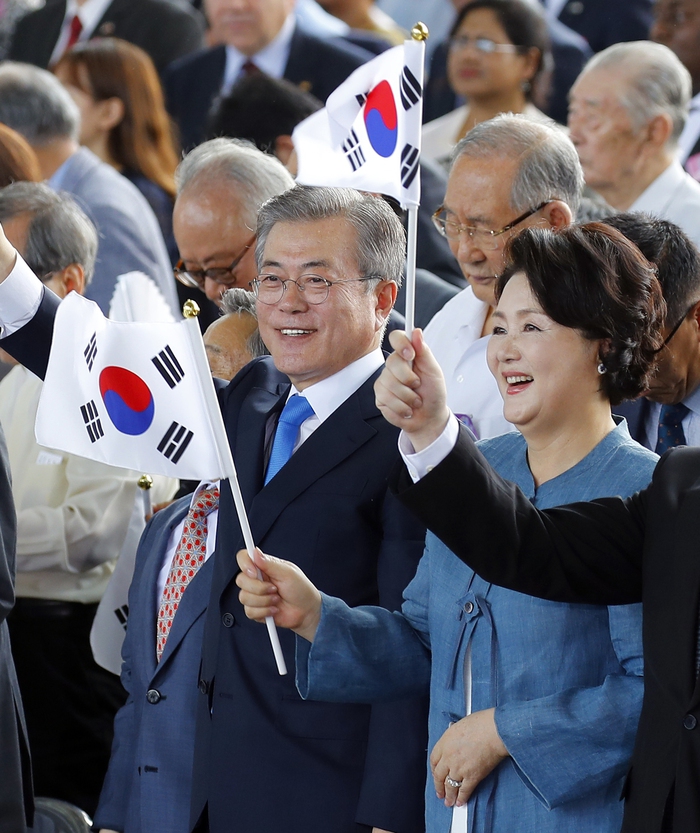 |
|
South Korean President Moon Jae-in and First Lady Kim Jung-sook wave South Korean flags at a celebratory event for the nation’s 73rd National Liberation Day at the National Museum of Korea in Seoul on Aug. 15. (Blue House photo pool)
|
Contents of this year’s Liberation Day suggests Moon’s “two-pronged approach”
On Aug. 15, the holiday marking Korea’s liberation from Japanese colonial occupation, South Korean President Moon Jae-in sent a message to the Japanese government calling for “cooperation” on a future of peace and prosperity in Northeast Asia. This was substantially different from Moon’s request for Japan to reflect on its past in his addresses for Liberation Day last year and on the March 1st Movement holiday this year. “Japanese Prime Minister Shinzo Abe and I have agreed to develop our bilateral relations in a future-oriented direction and to work together closely for the peace and prosperity of the Korean Peninsula and Northeast Asia. Such cooperation will eventually lead to the normalization of Japan-North Korea relations,” Moon said during his congratulatory address on Liberation Day. It’s unusual for a Liberation Day speech not to include a message for the Japanese government about the two countries’ fraught past. During his Liberation Day speech last year, Moon said, “The fact that we value the future of South Korea-Japan relations doesn’t mean we can pass over historical issues. Trust between the two countries will deepen when historical issues have been properly addressed.” And during his March 1st Movement speech this year, he criticized Japan’s territorial claims to Dokdo and took a firm position on the issue of the “comfort women” – by saying that “the Japanese government, as the aggressor, can’t say that this is over.” Moon’s “minimization” of the message to Japan on Wednesday appears to indicate his intention not to exclude Japan, as one of Korea’s important neighbors, from the process of achieving denuclearization and establishing a peace regime on the Korean Peninsula. This reflects Moon’s belief that Japan’s cooperation is essential for building momentum for the third inter-Korean summit and for North Korea-US negotiations. It also suggests that Moon intends to continue his “two-pronged approach” that separates South Korea and Japan’s past disputes from their present relationship. This appears to be in line with Moon’s remarks the previous day that the comfort women issue is a “universal human issue of women’s rights” and not “an issue that can be resolved through diplomacy.” Moon also said,“ I don’t want this issue to lead to a diplomatic conflict between South Korea and Japan.” “President Moon’s celebratory address was focused on the future-oriented drive to work together on building an economic community and coexistence and co-prosperity in Northeast Asia,” said a senior official at the Blue House. “The president expressed his intention to do what we ought to do, such as honoring the former comfort women by designating the Memorial Day for Japanese Forces' Comfort Victims a national day of remembrance,” another official said. By Seong Yeon-cheol, staff reporter Please direct comments or questions to [english@hani.co.kr]






